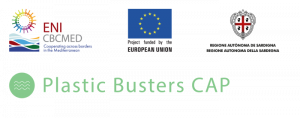
The Plastic Busters CAP project, “Fostering knowledge transfer to tackle marine litter in the Mediterranean by integrating Ecosystem based Management (EbM) into Integrated Coastal Zone Management (ICZM)”, as its name indicates, is about capitalizing upon and effectively transferring the available knowledge and tools that address the entire management cycle of marine litter.

WHAT DOES THE PROJECT CONSIST IN?
The Plastic Buster CAP project deploys a comprehensive, multilevel and strategic approach to facilitate the efforts of decision makers and stakeholders in effectively dealing with marine litters, among which the COVID-19 pandemic significant increase in the use of single-use plastics which account for up to 50% of beach litter. It will consolidate and fully exploit the knowledge obtained by 5 impactful projects in order to develop tailored-made capitalization outputs, i.e. tools and mechanisms addressing the entire management cycle of marine litter from monitoring and assessment to prevention and mitigation, that will create the enabling conditions for a societal shift towards sustainable consumption and production patterns, and a truly circular economy and a green economy.
The project is also about dissemination, and includes comprehensive communication actions via online tools and social media, targeted capacity building programmes for marine litter monitoring and mitigation, public participation actions and awareness raising campaigns targeted to local communities, networking events for amphidromous and constructive exchanges between stakeholders, policy dialogue workshops, joint commitments to concretise the uptake of the project results, effective mainstreaming via the strategic positioning of the several project partners and the strong ties with relevant policy groups.
EXPECTED RESULTS/OBJECTIVES
The Plastic Buster CAP has the potential to be an effective “game changer” when it comes to the marine litter in the Mediterranean. In the short- and mid-term the following changes are expected:
- Improved knowledge and deepened understanding of the marine litter threat by obtaining fit-for-purpose data from the pilot marine litter monitoring campaigns.
- Enhanced capacities of public institutions and stakeholders to address the entire lifecycle of marine litter from monitoring and assessment to prevention and mitigation;
- Strengthened local planning of coastal areas by introducing and promoting an ICZM approach for marine litter that embeds EbM principles;
- Extended replication actions to prevent and mitigate marine litter, guided by the demos of the project;
- Enhanced awareness of local communities, citizens and professionals on the role they can play in order to address the marine litter threat via the projects participatory, people-to-people interactions and communication actions;
- Reinforced waste management and environmental protection policies and marine litter priorities mainstreamed via the engagement of public administrations and decision-makers at local, national and regional levels;
- Strengthened multi-stakeholder networking at a basin-level for tackling marine litter in a coordinated and integrated manner.
In the long-term, Plastic Busters CAP will lead to:
- Sustainable use of the coastal and marine environment, fully exploiting the Blue Growth potential for the generation of new job opportunities;
- Enhanced ecosystem services via a reduced leakage of marine litter and marine plastic pollution in the coasts and seas;
- Reduced GHG emissions by reduced and wise-use and sustainable disposal of plastics.
PARTNERSHIP
Plastic Busters CAP is an ENI CBC MED project being implemented by a consortium of 8 Mediterranean partners led by the University of Siena.
Project’s website: https://www.enicbcmed.eu/projects/plastic-busters-cap




